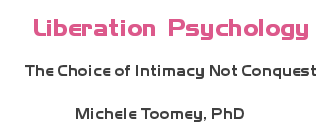The Integrity Challenge Of Caregiving
© 2011 Michele Toomey, PhD
Those of us who find ourselves in the role of caregivers come in various shapes and sizes, ages and gender, as introverts or extroverts. Yet we have many things in common: we find ourselves in the caregiver role, we care about and usually love the person who receives our care, we try to balance their needs with ours but theirs take precedence because they need care. The routine of our life is frequently interrupted by or primarily defined by those who need and receive our care.
If we are not careful, we can become defined by this caregiving role, and feel as though we are at its mercy. This orientation is dangerous because it could do us in. It has all the trappings of "martyrdom", and that is truly a deadly role. Martyrs have no life and life has no meaning other than the sacrifices of martyrdom. So we want to avoid this state at all costs. The best antidote for martyrdom is integrity and fairness. Fortunately, orientation is everything, and if our orientation to caregiving is grounded by integrity and fairness, we are protected from martyrdom and all it inflicts on us and on the receiver of our care.
The wonderful thing about integrity, defined as honesty and truthfulness and wholeness, is that it liberates and never oppresses. A caregiver governed by integrity is a liberated caregiver, and, therefore, the receiver of our care is liberated as well. There is no victim or victimhood when integrity is the governing principle of our life. Fairness is the outgrowth of integrity, and fairness protects both the caregiver and the care receiver.
It is a challenge to be a liberated caregiver governed by integrity. So often society in general and religion in particular offer us the model of selflessness and loving care with no boundaries. I propose to you that that model lacks integrity and never yields fairness, and, therefore, does not free us to be loving care givers without some aspect of martyrdom. A fatal flaw.
A liberated, loving caregiver must find the boundaries that suits who we are and to whom we are giving care. Somewhere between selfish and selfless there is an expanse that holds an imaginary line that we will not cross. A line that extends out from generosity and loving care and stops where selfless and self neglect begin. Each of us must find that line.
The greatest challenge of caregiving is not the many faceted needs of those who receive our care, rather, it is finding the integrity line that provides the boundary for our attentiveness and our care. Without it, we and they will pay a price that oppresses us and them on many different levels. They have less self-worth because they feel like such a burden, and we have less rejuvenating warmth in our heart becase we are so burdened. The loving bond between the caregiver and care receiver is tainted with muted fears and resentment. Shades of a burdened heart are dark and heavy. The bond is colored by this darkness, not a fair price for such an intimately interdependent relationship.
The key to being a liberated caregiver governed by integrity can be found in the very definition of integrity, truthfulness and honesty and wholeness. The vehicle for this honesty is self-expression governed by integrity. Caregivers must honestly reveal when they are near their line of selflessness, and step back. By claiming our fatigue, or feeling at the end of our rope or whatever signals for us we are at our boundary, we alert our care receiver and give them the opportunity to be thoughtful of us and give us the space we need to re-group and recoup our energy. This is liberating for both the care giver and care receiver and it allows our integrity to be sustained and fairness to prevail. No one is oppressed and both are liberated. An intimacy occurs that gives the boundary and image of a golden glow, penetrating the darkened hue of burden from ever giving us a heavy heart. We are together on this difficult but loving journey of care giver and care receiver. We are bleased even as we have been forced to deal with disability.
We have a choice as to how we deal with it, and I invite you to choose the integrity and fairness of liberation, for your own protection and the protection of your care receiver. By being honest with ourselves and with them, we can be governed by both integrity and fairness. This will yield a chance for both to have a life where each one's needs and desires have a turn, and no one need be martyred in the process of care giving. Let us join hands and hearts as liberated caregivers and receivers. Even though our path is difficult, our hearts are one, and that makes all the difference. |



